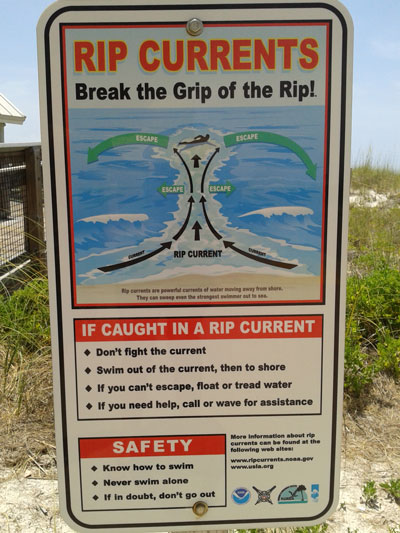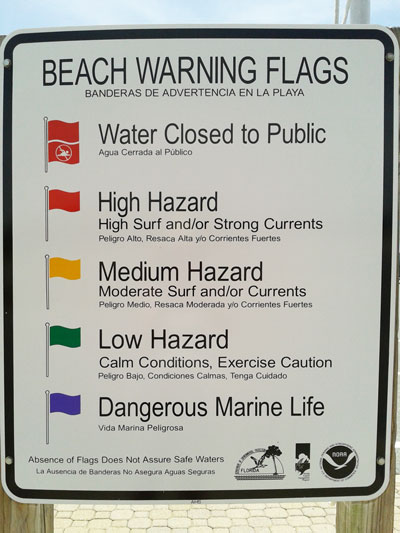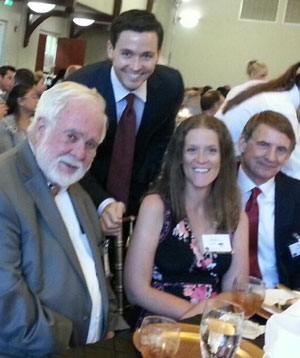Dear Florida Climate Center Friends,
We'd like to present you with the July 2013 edition of our newsletter. In this newsletter, you'll find our monthly climate summary, a list of special events that our staff attended, an example of a data request made to the office, and more. If you have any questions, please email us at climate@coaps.fsu.edu.
Thanks,
The Staff of the Florida Climate Center
 |  |  | David Zierden
State Climatologist | James O'Brien
Professor Emeritus | Melissa Griffin
Asst. State Climatologist |
|
June Climate Summary for Florida
|
|
Rip Current and Lightning Safety
Since March, there have been a few dozen surf rescues and, unfortunately, about a dozen deaths along the Florida coast due to rip currents. Rip currents form when waves break near the shoreline, and some of the waves break stronger in some locations than others. This causes a circulation of fast-moving water that travels back offshore. There are signs posted at most beaches of a diagram of what a rip current looks like, and what to do if you're caught in one. In addition, the state of Florida has a beach flag system that can easily describe the surf condition based on a color scale.
 
Earlier in June, the National Weather Service dedicated a week to Rip Current Safety, which can be found at the following link: http://www.ripcurrents.noaa.gov/index.shtml
Lightning safety is also very important in a state that averages 25 strikes per square mile. This year alone, 2 people have died from being struck by lightning. June, July and August are the peak months for lightning activity across the United States and increased summer outdoor activities. The National Weather Service set aside the last week of June to promote and educate lightning safety across the U.S.: http://www.lightningsafety.noaa.gov/
|
|
Florida Gardeners Learn About Climate Change
State Climatologist David Zierden presented information on climate variability and change to a group of Florida gardeners on June 19, 2013. University of Florida IFAS Extension hosted a garden and design seminar for the Florida Federation of Garden Clubs covering many topics over two and a half days. The State Climatologist explained about the year-to-year variations in climate caused by the El Niņo/La Niņa cycle as well as longer variations in temperature, rainfall, and damaging freezes that are all important to gardening. He also pointed out how proper community planning and green space can help mitigate the rise in temperatures due to the urban heat island effect.
|
|
Former Student Honored by University
On June 21st, Mr. Michael Lowry, an alumnus of the Center for Ocean-Atmospheric Prediction Studies and the Florida Climate Center, was honored by the FSU Alumni Association with becoming the 1st ever two-time recipient of the FSU Thirty Under 30 Award. The award highlights thirty Florida State alumni, all of whom are 30 years old or younger and are selected by fellow FSU graduates for their contributions to their professions, communities or FSU. Mr. Lowry's work with the National Hurricane Center in the development of a new storm surge forecast model and his current work with the Weather Channel led to him receiving the prestigious Reubin O'D. Askew Young Alumni Award, which is the highest honor bestowed upon young alumni by the FSU Alumni Association.
 | | From left: Former State Climatologist Dr. James J. O'Brien, Michael Lowry, Assistant State Climatologist Melissa Griffin, and former FSU alumni and current head of the Weather Channel Bryan Norcross at the award ceremony. |
|
|
Upcoming Events
July 7-12, 2013:
Annual Meeting of the American Association of State Climatologists in St. Louis, MO
|
|
Example Data Request
Each month, we highlight here recent examples of some of the many public services provided by the Florida Climate Center:
Data and information requests submitted to the Florida Climate Center are typically related to the weather and climate of Florida and are usually submitted by residents of or visitors to the Sunshine State. But occasionally, someone contacts the office asking if we can provide information for another state. While the office specializes in the climate of Florida, we have access to all of the historical climate information on file at the regional climate centers and the National Climatic Data Center. The office was recently contacted by a couple planning a destination wedding in Nantucket, Massachusetts, next June. They were trying to escape the heat and rainfall that is normal for Florida during the summer months. The Florida Climate Center was able to give them historical weather data for each of the four Saturdays in June and put them in contact with service climatologists at the Northeast Regional Climate Center for more in-depth climatic knowledge of the area. |
|
About Us
The Florida Climate Center is part of a three-tiered system of national, regional, and state climate offices, including NOAA's National Climatic Data Center and the Southeast Regional Climate Center. The Florida State Climatologist and other staff at the Florida Climate Center provide the following information and services to the people of Florida:
· Climate Data:
Historical weather observations for weather stations throughout the state of Florida. We are able to provide data for most stations from 1948-present.
· Climate Information:
Long-term historical averages for various stations, climate divisions, and the entire state.
· Extreme Event Records:
Information and analyses on extreme events such as freezes, droughts, floods and hurricanes.
· Special Analysis:
With their vast knowledge of El Niņo, La Niņa and climate variability, the State Climatologist and staff can offer expert insight into Florida's climate trends.
· Outreach:
Activities, presentations, and workshops that inform and educate the people of Florida about current and emerging climate issues. We also coordinate volunteers for the Community Collaborative Rain, Hail & Snow Network (CoCoRaHS).
More About Us
|
|